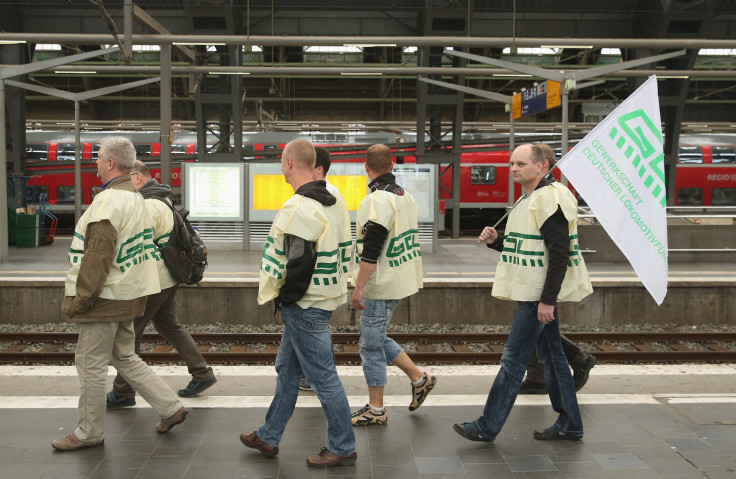German Rail Strike 2015: Train Drivers Plan For Longest Railroad Work Stoppage In Nation's Post-War History

German train drivers are on strike this week, bringing major disruptions to the Deutsche Bahn, the main freight and passenger rail network in Europe's largest economy. The 20,000-member drivers’ union, GDL, wants a 5 percent hike in wages, an hour less of work per week, and the right to bargain for 17,000 nondriving personnel like conductors and porters. Drivers vow to stay off their jobs until Sunday. It is the eighth strike in 10 months of labor negotiations and could become the longest railroad work stoppage in the nation’s postwar history.
Freight-train operators began the strike Monday, with passenger-rail drivers joining in Tuesday. Commuters are feeling the impact. Deutsche Bahn said it would cut two-thirds of its long-distance services and run just 15 percent to 60 percent of its local trains, depending on the region.
The German Chambers of Commerce estimated the dispute could cost $560 million, and the Federation of German Industry said it will hurt the steel, chemicals and auto manufacturing sectors.
Deutsche Bahn slammed the work stoppage as “completely inappropriate and over the top,” saying the union would cause “massive harm [not just] to rail passengers, Deutsche Bahn and its employees, but also to the German economy.”
Chancellor Angela Merkel called on both sides to accept a mediator, a proposal that garnered support from the country’s top trade union federation. But GDL chief Claus Weselsky rejected the idea, promising not to “sacrifice” the “constitutionally protected right to strike for arbitration.”
As the Wall Street Journal noted, the strike comes amid mounting labor strife in Germany, as trade unions emerge from a period of relative compromise with employers. Last year, 155,000 workdays were lost to strikes, compared to just 25,000 in 2010.
© Copyright IBTimes 2024. All rights reserved.






















